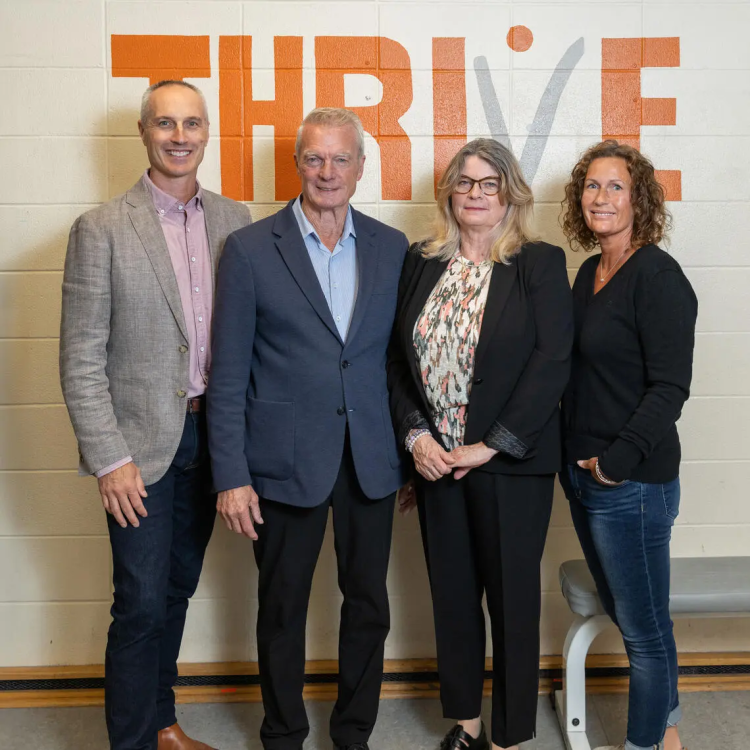Sean Walsh and his family were taking in the World Junior Hockey Championships in Edmonton in 2022 when a bout of severe abdominal pain landed him in the emergency room.
A kidney stone turned out to be the culprit, but the X-ray also revealed something far more concerning: three large tumours on his kidney and adrenal glands.
"I felt immediate panic," says Walsh, who was 48 at the time. "I remember calling my wife, Julia she was at the hotel with the kids and asking her to come down to the hospital right away."
"We just sat and cried for a little bit," says Julia Surerus-Walsh.
The family returned to Calgary with a diagnosis of stage 4 renal cell carcinoma and things moved quickly from there. One month to the day after he was in that Edmonton emergency room, Walsh was on an operating table at the Rockyview General Hospital.
The surgery was a success, leaving no evidence of disease and sparing him from chemotherapy and radiation treatment. But Walsh felt far from relieved.
"I had a massive panic attack, feeling like the other shoe was going to drop," he says. "Every part of my life was about cancer, every thought. It was overwhelming."
Finding hope and support through movement
What finally helped was something unexpected: exercise.
At the suggestion of his oncology nurse, Walsh connected with the Thrive Centre, a fitness facility at the University of Calgary's Faculty of Kinesiology that offers exercise programs for people living with cancer.
"Exercise oncology is about movement, from the point of diagnosis, through treatment and into longer-term survivorship," explains Thrive Centre director Dr. Nicole Culos-Reed, PhD, a professor with the Faculty of Kinesiology who co-founded the centre in 2011.
"More-recent exercise oncology evidence shows there are survival benefits from engaging in exercise, similar to drug trial outcomes. Exercise is truly one of the best things people can do to live well, but, for individuals with cancer and all the barriers they may face, we need to build a system that supports their access and engagement in movement."
The Thrive Centre offers that support, not only in the form of physical space and equipment, but with trained instructors and a caring community.
"We have a very unique model," says Culos-Reed. "It's not just an exercise class; it's about empowering people."
By building a network of support around movement, Thrive helps people living with cancer regain both their physical strength and a sense of control in the face of cancer, on top of increasing survival, reducing risk of recurrence and enhancing quality of life.
Walsh can attest to the importance of community, having formed a strong bond with his fellow Thrive participants.
"It's not so much about cancer when we're here with each other," he says.
"It's a safe place. You can be yourself, you can laugh, you can be angry but we're all together, supporting each other.
"Aside from my family, it's been the best part of my life."
Personal experience drives community investment
And his family saw the difference. So much so that Surerus-Walsh, who serves on the philanthropy committee of her family's business, suggested the company support the Thrive Centre.
Her father started Surerus Pipeline Inc. in Fort St. John, B.C., more than 50 years ago, and, while it's grown into one of Canada's leading pipeline contractors, the business maintains small-town community values.

The Surerus family from left: Sean Surerus (president of Surerus Pipeline Inc.), Brian Surerus, Connie Surerus and Julia Surerus-Walsh decided to support the Thrive Centre through their company to help others living with cancer. Photo Credit: Adrian Shellard
"It's always been a part of the company," says founder and CEO Brian Surerus. "Even when it was small, even when we didn't necessarily have the money, we'd give back."
"It's not just about making a profit. It's about giving back where our employees and their families live and work," adds Connie Surerus, Brian's wife.
"More and more people are being diagnosed with cancer, unfortunately, and, when we learned how important the Thrive Centre is and saw the difference it made for Sean and Julia, it just made sense to support it."
The Thrive Centre's approach to program delivery expanding services to rural and remote locations where resources for cancer patients are often limited also appealed to the Surerus family, reflecting their commitment to community.
Donation keeps research and participants moving
Surerus Pipeline's gift of $575,000, made earlier this year, is a game-changer for the Thrive Centre and it couldn't have come at a better time, with current funding coming to an end. Putting the program on hold, even for a short period, would have been detrimental to both the research and people who rely on the service.
"It's validating, having that vote of confidence from them," says Culos-Reed. "There are many good causes out there so it's really meaningful that they chose to support us and that they recognize the impact of what we're doing, that we're building something the community needs."
That community includes Sean Walsh, who still exercises regularly with his group, three years later. He recalls a moment a while back when, feeling healthy once again, he wondered if he should leave the program, but Surerus-Walsh shut that down fast.
"My wife won't let me," he says with a laugh. "She said, You're happier than you've been in years.' And, yeah, I am. Probably happier than even before my diagnosis.
"That kidney stone saved my life, but Thrive is what really changed my life for the better."
Just as a single spark can ignite a roaring flame, philanthropy is the catalyst that starts something special at the University of Calgary. Explore more stories about the difference we're making in the community and around the world with the support of donors like you.










